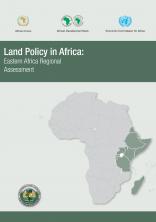Land Policy in Africa: Eastern Africa Regional Assessment

The African Union Commission (AUC) and African Heads of State and Government are committed to providing a conducive environment for economic growth, poverty reduction and equitable sustainable development. In this context, the quality of governance of land and natural resources is an important factor. Accordingly, better performance of land policies and institutions is required to deliver development goals. Land reforms must equitably address the needs of all land users, including smallholder farmers, the private sector, the urban poor and slum dwellers. Ths is especially because land is no longer readily available and there are rising pressures and tensions stemming from competition for this valuable resource.
Land policy needs to secure the rights of all land users and serve the multiple goals of equity, poverty reduction, income growth, economic effiency and sustainable environmental management. Given the importance of land to economic and social development and to ensuring peace and security, the majority of African governments have embarked on land policy and institutional reforms to address land issues in the context of national development. The key issues that need to be addressed in this context are: securing land rights to improve livelihoods and facilitate economic development; the centrality of urban land delivery and urban land development; natural resource access and sustaining common property resources; property rights and environmental sustainability; equitable land distribution and restoring alienated land; land and gender issues;and land and conflct.
To facilitate land policy formulation and implementation within the framework of the New Partnership for Africa’s Development (NEPAD) and in line with the Millennium Development Goals (MDGs), the consortium of AUC, the Economic Commission for Africa (ECA) and the African Development Bank (AfDB) in collaboration with regional economic communities have initiated a process of developing a framework and guidelines for land policy in Africa. The framework and guidelines are vital tools aimed at complementary national and regional processes for land policy formulation and implementation, with a view to strengthening land rights, enhancing productivity and securing livelihood.
The framework and guidelines will be useful in supporting regional and national land policy formulation and implementation processes through affording opportunities for peer learning. Th framework and guidelines will also provide guidance on benchmarks and indicators for tracking progress achieved in land reform. The process of developing the framework and guidelines includes regional assessments and consultations. Th regional assessments aim to raise land policy issues that highlight specifiities in existing initiatives and lessons that will enrich the framework and guidelines. The assessments will also help to identify challenges, knowledge, institutional and resource gaps as well as ongoing initiatives. Ths will assist in mapping out a strategy for capacity building and lesson-sharing activities vital to the implementation of the framework in the medium to long term.